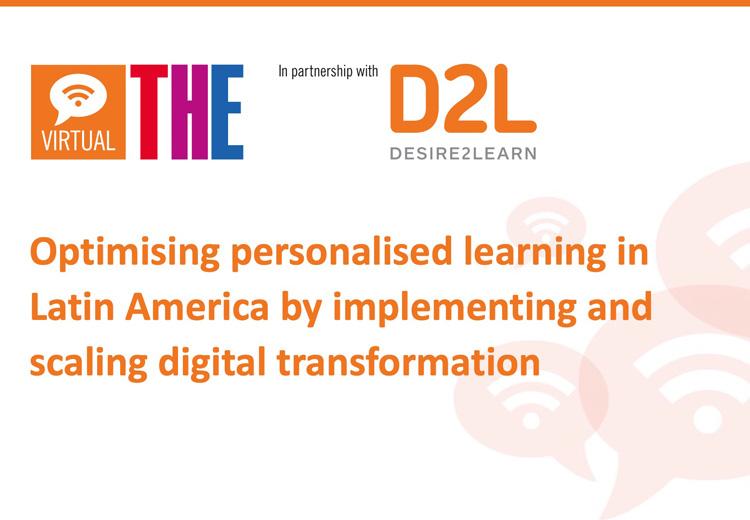Technology allows a level of personalisation that would be difficult, if not impossible, with only face-to-face learning, agreed the panellists at a recent Times Higher Education webinar, held in partnership with education technology company D2L. The conversation was framed by findings from a survey by D2L, which asked higher education experts to share their insights on digital transformation in the sector.
“A professor, for instance, cannot provide personalised feedback for each one of the dozens of students that they have in traditional classes,” said Peterson Theodorovicz, regional director for Brazil at D2L. Online tools, though, can allow teachers to tailor the educational experience and track students’ progress.
Although the pandemic pushed digital transformation forward at higher education institutions, the trend was already underway across the world, including in Latin America. However, learning management systems were often used for content storage in the past. Today, “it is a tool to support the learning process”, said Carolina Rivas, regional director for Latin America at D2L.
“Nowadays, you can see the interaction between teachers and students, you can see discussions on the platform, you can see how students work with other students,” Rivas said. “We can support the learning process in order to achieve academic goals.”
Different student groups require different support, the panellists said. Technology plays an important role in generating the data to support their various needs. “Students are demanding more personalised content, personalised paths of learning,” Theodorovicz said. To deliver that, institutions and faculty must consider how each student progresses.
Younger students consume content differently to previous generations, said Marcel Gama, chief finance officer at Faculdade Capital Federal in Brazil. “We need to adapt,” he stressed. One way in which his institution has adapted is by boosting the use of video content, which it has found to be very important for the learning process.
For Anna Karina Cruz López, education technology coordinator at Anahuac Mérida in Mexico, her institution had to rethink the way that it packaged content. “Mobile learning is our reality, and our students are not tied to a PC or a computer,” she said.
Smartphone penetration in Latin America stands at about 70 per cent, creating an opportunity for institutions to reach learners via their phones. The panellists agreed, however, that connectivity remained an issue for students and staff on the continent.
Digital education also enabled institutions and faculty to identify which students required assistance, helping to cut dropout rates, said Diego Mauricio Mazo, chancellor at CEIPA Business School in Colombia. “It helps to have earlier alerts to prevent the cessation and increase the retention” he said. Mazo emphasised that technology should evolve to have new, more intelligent tools to support educators in routine tasks.
Cruz López agreed: “We need that data to intervene in a better way in being more proactive, having the right response, adapting not only content but activities and quizzes and their rhythm.”
To unlock the full potential of digital education, training is vital for both students and faculty, said Rivas. “The key point is training, but not just one or two separate sessions, more like a real, complete programme,” she said.
Institutions need to be sure that the whole higher education community is “using the tools in the right way to achieve the academic goals, in order to be sure that the students are developing the right skills”, Rivas added.
The panel:
- Marcel Gama, chief finance officer, Faculdade Capital Federal
- Anna Karina Cruz López, education technology coordinator, Anahuac Mérida
- Alistair Lawrence, special projects editor, Times Higher Education (chair)
- Diego Mauricio Mazo, chancellor, CEIPA Business School
- Carolina Rivas, regional director for LATAM, D2L
- Peterson Theodorovicz, regional director for Brazil, D2L
Watch the webinar on demand above or on the THE Connect YouTube channel.
Find out more about D2L's survey findings and learn about the digital transformation journey that organisations have embarked on across the LATAM region.


comment